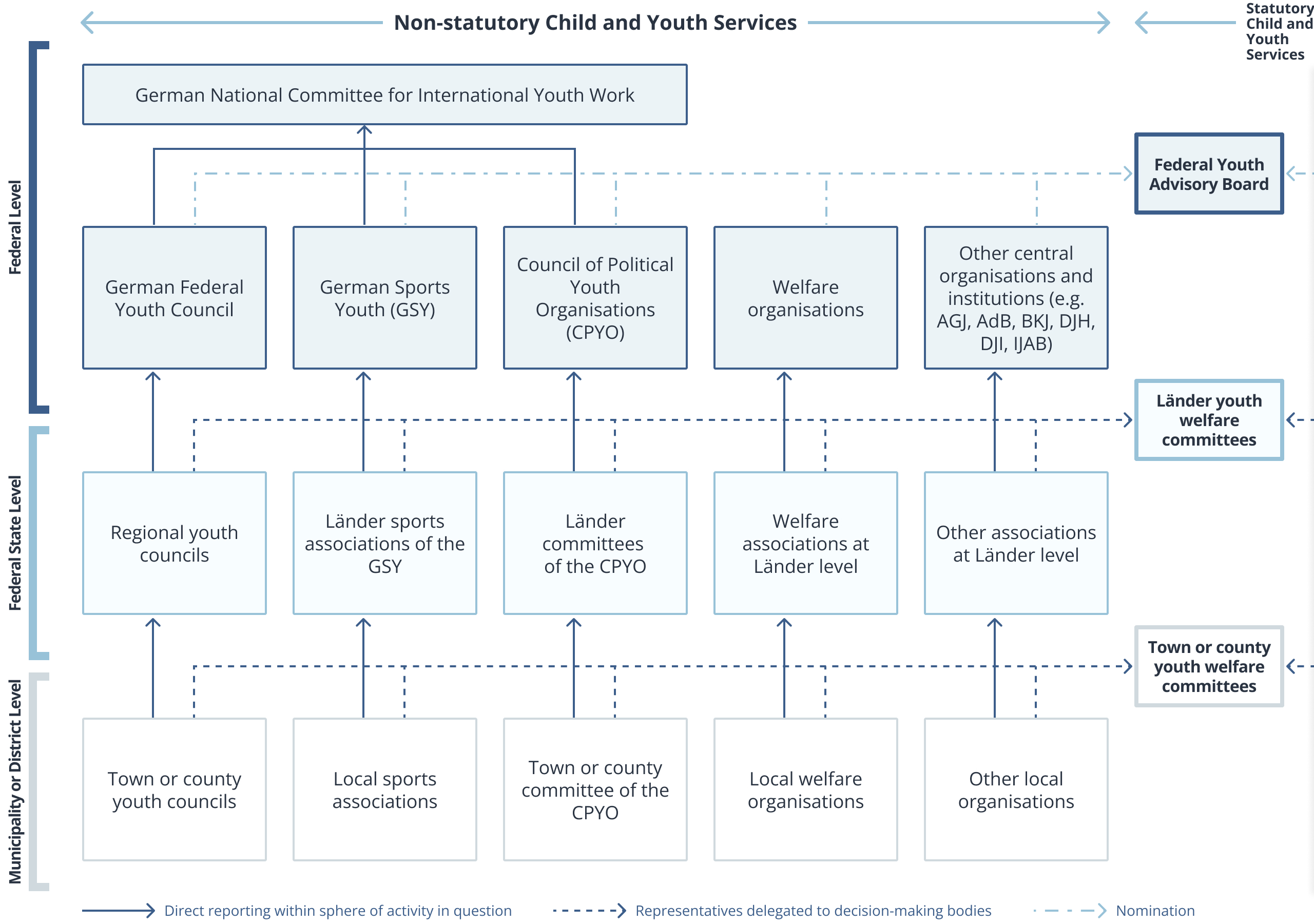Notes
In Germany, the child and youth services field comes under the country’s Social Code. Services are developed and provided at the federal, Länder (federal state) and local level.
Federal level
At the federal level, child and youth policy affairs are coordinated by the Federal Ministry for Family Affairs, Senior Citizens, Women and Youth. The Ministry is the interface to the Federal Government and occupies a supporting and encouraging role on behalf of the child and youth services community of practice. The Federal Youth Advisory Board, a panel of expert policymakers, administrators, association representatives and researchers appointed by the Federal Youth Ministry, advises the Federal Government on fundamental issues relating to child and youth services and other cross-cutting child and youth policy matters.
The key functions of the German Bundestag, the lower house of parliament, are legislation and government oversight. Through the Bundesrat, the upper house of parliament, the Länder (federal states) influence federal legislation and administration as well as matters pertaining to the European union.
The Working Party of the Highest Youth and Family Authorities of the Länder supports the Conference of Ministers for Youth and Family Affairs in all matters relating to child and youth services, youth protection, and youth and family policy and prepares resolutions to be adopted by the Conference of Ministers. It occupies a coordinating role when it comes to fundamental aspects of the appropriate and uniform implementation of child and youth services legislation and family policy across all Länder, and represents the interests of the Conference of Ministers vis-à-vis the Federal Government.
The Federal Work Group for State Youth Welfare Offices is an association of the 17 youth offices of the 16 Länder (North Rhine-Westphalia has two). It draws up joint procedures and principles governing the youth services that are provided at the federal, Länder and local levels. It submits opinions on draft legislation on youth services, produces recommendations and handbooks, and helps ensure the uniform application of Book 8 of Germany’s Social Code across the country. It also cooperates with specialist organisations as well as statutory/non-statutory (public-sector) child and youth services providers.
The associations of local authorities (Association of German Cities, German County Association, German Association of Towns and Municipalities) are local-level interest groups that work to promote local self-government, make their voices heard vis-à-vis policymakers and the general public, and encourage the exchange of information and experiences.
Youth associations are youth policy partners when it comes to social participation, defending the interests of children and adolescents, and promoting young people’s political participation. The German National Committee for International Youth Work represents the interests of Germany’s youth organisations at multilateral level.
Welfare organisations and other providers of non-statutory child and youth services occupy a number of functions, including infrastructure design and participation in political decision-making. See also Provider structures in child and youth services.
Länder level
The Länder (federal states) are responsible for activities and services that are not provided by the Federal Government or which are not assigned to the federal level under Germany’s Basic Law. It follows that they carry responsibility for the vast majority of education legislation and cultural policy, along with municipal law and police affairs.
The powers of the Länder lie largely in the administrative sphere as well as in their capacity to influence federal law through the Bundesrat, or upper house of parliament. The Länder are exclusively responsible for interior administrative affairs, while their authorities are responsible for implementing the majority of federal laws and regulations.
The highest youth authority of each Land promotes the activities of statutory and non-statutory child and youth services providers and encourages the continued development of the field.
Book 8 of the Social Code (Child and Youth Services) requires the Länder to each establish a youth welfare office of their own, consisting of a Land youth welfare committee and the required administrative structures, and to assist it in fulfilling its duties.
The associations of local authorities at Länder level represent their members‘ interests vis-à-vis the Land government or parliament and the general public.
With regard to public child and youth services, it should be noted that the respective Land regulations are not included in the chart or are only insufficiently represented.
Local level
Generally speaking, child and youth services are provided in close geographical proximity to the children and adolescents who receive them. Under Book 8 of the Social Code, overall responsibility for child and youth services lies with the district and independent cities. Also in accordance with Book 8, responsibility for organising statutory child and youth services at the local level lies with the youth welfare offices. Each city and district in Germany has its own youth welfare office. When it comes to planning, ensuring and financing the provision of child and youth services, the municipal youth welfare offices play the main role.
The youth welfare offices are responsible for ensuring that the tasks and services prescribed in Book 8 of the Social Code are provided. This is done by the youth welfare committee and the administration.
On the tasks provided by the child and youth services system, see also
On the structure of organisations providing child and youth services, see
- The Federation, the Länder and the local authorities in child and youth services (a),
- The Federation, the Länder and the local authorities in child and youth services (b),
- Local public-sector providers of child and youth services,
- The dual structure of the youth welfare office,
- Provider structures in child and youth services.



